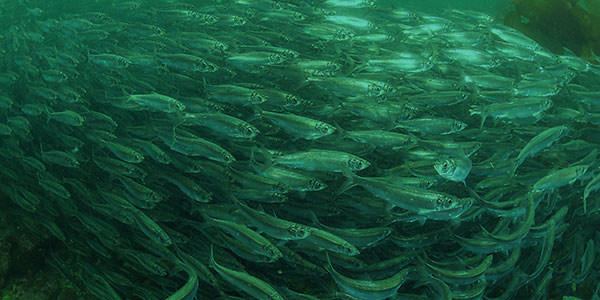Canadian harvesters and consumers both benefit from fisheries monitoring and increased transparency across the seafood supply chain. Monitoring fishing activities not only helps minimize bycatch and prevent overfishing, but it enables the story of where your seafood comes from to be told, which allows people to make more sustainable choices.
Voices
Experts Speak Out Loud and Clear


The decline of culturally significant fish species is not only a loss of food but also a loss of identity and culture. Canada’s obligation to rebuilding fisheries is inextricably linked with its commitment towards reconciliation. This requires a balanced approach to fisheries management that embraces the unique knowledge systems held by Indigenous Peoples.

To restore ocean abundance in the face of climate change, more conservation-focused fisheries management is required, but it should not stop there. To rebuild overfished stocks, it is imperative to fully account for species vulnerability to climate change and urgently employ adaptive management strategies.

The continuing poor health of Canada’s fish stocks clearly indicates that we’re failing to manage our fisheries and we’re getting a dismal return on investments. The loss of abundance and diversity — and the consequences that creates for future generations — cannot be overstated.
Numbers
Science
How healthy are stocks today and how different factors will affect them in the future.
* 2018 to 2020 data available at Oceana.ca/FisheryAudit2021
Monitoring
Determine how many fish are
harvested and discarded
each year.
* 2018 to 2020 data available at Oceana.ca/FisheryAudit2021
Management
Based on data that consider the entire ecosystem and prioritize long-term health.
* 2018 to 2020 data available at Oceana.ca/FisheryAudit2021
TIMELINE
The policies governing fisheries management have come a long way in the past six years. For the first time in 150+ years, Canada has put in place legal and regulatory requirements to rebuild depleted fisheries. But so far, that hasn’t resulted in meaningful change on the water. To start rebuilding ocean abundance, key actions are still needed.
Federal government
Fisheries and Oceans Canada
Federal government
Fisheries and Oceans Canada
October 2016
Key gaps in DFO’s fisheries management identified by Office of the Auditor General
November 2016
National Oceans Protection Plan introduced, backed by $1.5 billion
October 2017
Seven rebuilding plans published†
† As reported in Oceana Canada’s first annual Fishery Audit
November 2017
Starts publishing annual work plans
November 2018
$107.4 million committed to over five years and $17.6 million ongoing to implement the Fish Stocks provisions (FSP) in the amended Fisheries Act
November 2018
Five new rebuilding plans
June 2019
Modernized Fisheries Act becomes law
November 2019
Fishery Monitoring Policy released
January 2021
Draft regulations to implement rebuilding requirements published
November 2021
Two new rebuilding plans published
July 2022
Additional $2 billion investment over nine years under the Oceans Protection Plan
April 2022
Regulations published prescribing 30 major fish stocks to the FSP and establishing rebuilding plan requirements
October 2022
62 major fish stocks proposed and available for public comment
November 2022
One new rebuilding plan ++
++ Under the Fish Stock provisions, all existing rebuilding plans for critical stocks will require revisions to meet the new rebuilding requirements of the Fisheries Act. For prescribed stocks, revised rebuilding plans must be published within 24 months of being listed in the regulations, unless a 12-month extension is required.
June 2023 (Estimated)
All remaining critical and cautious stocks are added to the regulations under the Fisheries Act
June 2024 (Estimated)
The Government of Canada conducts a five-year review of the Fisheries Act
January 2024 (Estimated)
Fishery Monitoring Policy is fully implemented in least five stocks in each DFO Region
All “uncertain” stocks are assigned a status and, as the Fisheries Act stipulates, those in the critical zone require rebuilding plans
April 2024 (Estimated)
All rebuilding plans for stocks listed in April 2022 are published, unless extensions are warranted
December 2024 (Estimated)
A final batch including all remaining fish stocks are listed in regulations
Solutions
Change is needed
The need for science-based precautionary fisheries management has never been greater – to build resiliency, hedge against climate change risks and create a thriving ocean economy.
Recommendations
Prescribe all remaining stocks in the critical and cautious zones to the Fish Stocks provisions in the Fisheries Act, and make management decisions that are consistent with the rebuilding regulations.
Meaningfully engage with Indigenous communities and organizations to make decisions about wild fish that are informed by Indigenous Knowledge Systems, as well as the best available science.
Integrate ecosystem impacts into fisheries decisions, prioritizing rebuilding depleted forage fish and addressing vulnerabilities
Count everything caught in a fishery — including for recreational and bait purposes — and make decisions that account for all sources of fishing mortality.
To do checklist
Science 
- Publish a work plan that includes priorities and timelines for assigning LRPs and a health status for all “uncertain” stocks.
- Assess and document the vulnerability and climate risk of all stocks to enable climate-resilient management.
- Ensure the effects of climate change are considered consistently by integrating environmental variability into both assessments and advice.
Monitoring 
- Advance monitoring activities identified in the Sustainable Fisheries Framework Work Plan, prioritizing stocks suspected of having issues with the quality of fishery monitoring data.
- Fully implement the Fishery Monitoring Policy in at least five stocks in each DFO Region each year until the policy has been implemented for all major stocks.
- Publish an annual progress report to the Fisheries Minister.
Management 
- Implement eight new rebuilding plans.
- Include all remaining critical and cautious stocks in upcoming batches subject to the Fish Stock provisions.
- Implement a long-term national climate change adaptation strategy and risk-based frameworks.
- Implement management decisions and strategies for all forage fish that account for the role of forage fish in the ecosystem in line with the Policy on New Fisheries for Forage Species.

